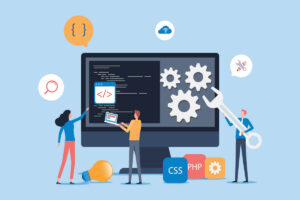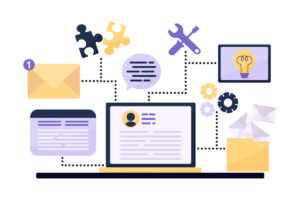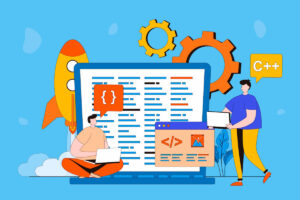In this era of rapid digital growth, PHP web development continues to be a critical skill for any aspiring web developer. This blog is designed to guide you on your journey from a novice to a pro in PHP web development by 2024. We’ll delve into the basics of PHP, introduce you to advanced concepts, explore popular PHP frameworks, and discuss the future trends and predictions in PHP web development. Our aim is to equip you with the knowledge and skills necessary to excel in this industry. So let’s embark on this journey together!
Basics of PHP
PHP, or Hypertext Preprocessor, is a server-side scripting language that is widely used in web development.
It is the backbone of many dynamic websites and applications, and as of 2022, it powers nearly 76.5% of all the websites on the internet, according to W3Techs.
A foundational grasp of PHP is crucial for anyone aiming to excel in PHP web development. This section will provide a comprehensive introduction to PHP, covering its syntax, data types, variables, and basic programming concepts. By mastering these fundamentals, you’ll have a solid understanding of how PHP works and be well on your way to becoming a pro.
Advanced PHP Concepts
Once you’ve mastered basic PHP, explore its more complex aspects to unleash its full potential. Delve into advanced topics that amplify the versatility of this language. In this section, we’ll explore advanced PHP concepts such as:
- Arrays and Objects: These are more complex types of data that allow you to store and manipulate multiple values in an organized manner.
- Functions: These reusable pieces of code can be called upon throughout your program, enhancing efficiency and readability.
- File and Database Handling: Learn how to interact with files and databases to store, retrieve, and manipulate data.
- Error Handling: Mastering this will help you write robust software that can handle and recover from unforeseen circumstances.
Understanding and applying these advanced PHP concepts will equip you to handle diverse programming challenges. You’ll adeptly create dynamic, efficient, and secure web applications.Keep practicing and honing your skills, and you’ll soon become a PHP expert. Overall, the key to becoming proficient in PHP is continuous learning and practice. With dedication and perseverance, anyone can master this powerful language and create amazing web applications.
Introduction to PHP Frameworks
PHP frameworks significantly streamline the process of PHP web development, offering organized, reusable, and maintainable code. They follow the MVC (Model-View-Controller) pattern that ensures separation of presentation and logic, promoting modern web development practices. PHP frameworks provide robust scalability, security features, and efficiency, which can significantly reduce the time required to build complex websites or applications. Here are a few popular PHP frameworks that have become a staple in the PHP web development community:
- Laravel: Renowned for its elegant syntax, Laravel is a PHP framework that prioritizes simplicity, clarity, and readability of code. It offers a rich set of functionalities that incorporates the basic features of PHP frameworks including MVC architecture, security, and data migration.
- Symfony: This PHP framework offers robust architecture that is highly adaptable to different web projects. It has an extensive set of components and tools that enable rapid development without compromising on performance or security.
- CodeIgniter: CodeIgniter is a lightweight PHP framework, perfect for beginners and small-scale projects. It offers exceptional speed and simplicity while providing essential features such as MVC architecture, database abstraction, and form validation.
- CakePHP: As its name suggests, CakePHP aims to make web development as easy as a piece of cake. It follows the MVC pattern and offers features such as scaffolding, database access, and built-in security tools.
- Yii: Yii stands for “Yes, it is!” and true to its name, it packs a punch in terms of performance and features. It follows the MVC pattern and offers powerful caching mechanisms, security measures, and extension libraries for rapid development.
By mastering these frameworks, you can take your PHP web development skills to the next level and improve your ability to deliver high-quality, efficient, and secure web applications.
Reasons to Use a PHP Framework
- Seamless Development: A framework provides a structured and organized approach to web development, making it easier for developers to write clean code and collaborate with team members. This results in faster development time and better quality of code.
- Efficient Debugging: With its built-in debugging tools and error handling mechanisms, a PHP framework helps identify and fix bugs quickly, saving time and effort for developers.
- Security: Frameworks offer built-in security features such as input validation and protection against common vulnerabilities like SQL injection, cross-site scripting, and more. This ensures that your web application is safe from potential threats.
- Reusable Code: Most PHP frameworks come with a set of libraries and modules that can be reused in different projects, reducing the need to write repetitive code and improving efficiency.
- Scalability: Frameworks provide scalability options for web applications that can handle large amounts of traffic and data. This is especially beneficial for growing businesses.
- Community Support: PHP frameworks have a strong community support with regular updates, bug fixes, and new features being implemented based on user feedback. This ensures that your web application stays up-to-date and relevant.
- Integration with other Technologies: PHP frameworks easily integrate with other technologies such as JavaScript, HTML, CSS, and databases like MySQL. This allows for more flexibility in web development and enables developers to create dynamic and interactive applications.
Keep these advantages in mind when choosing a PHP framework for your next project. Whether it’s speed, security, reusability, scalability, or community support you’re looking for, a PHP framework has got you covered.
Mastering PHP with Laravel
Laravel, a highly popular PHP framework, stands out as an exceptional tool for modern web application development. PHP offers a clean, elegant syntax, favored by many developers for its ease of use. It’s a top choice among PHP developers due to its enjoyable learning curve. Laravel simplifies development tasks like routing, authentication, sessions, and caching, freeing developers to focus on the creative aspects of web applications by easing common tasks. With Laravel, developing PHP applications is a streamlined, efficient process, delivering robust and secure results. By mastering PHP Laravel, developers can enhance their capabilities and deliver high-quality software solutions.
Industry Best Practices for PHP Development
Adhering to industry best practices in PHP web development is paramount to delivering optimized, secure, and scalable software solutions. Keeping code organized and using version control systems are essential for tracking changes. Enforcing a strict naming convention ensures consistent and logical names for functions and variables, enhancing code readability and maintenance. Furthermore, error reporting should be turned on during the development process to spot and rectify potential issues early on. Lastly, always ensure that the code is thoroughly tested at every stage of the development process to ensure the highest quality output. By adopting these best practices, PHP web development can result in efficient, reliable, and robust web applications.
PHP in 2024: Trends and Predictions
With PHP 8.1 introducing new features and improvements, there’s a lot to look forward to in PHP’s future. Staying aware of emerging technologies and trends will help you stay ahead of the curve in 2024 and beyond. Here are some predictions for the future of PHP web development:
- Continued Dominance: Despite new technologies emerging, PHP will continue to dominate the web development industry due to its versatility and wide adoption.
- Increased Demand for Customization: As businesses strive to create unique and personalized user experiences, there will be a higher demand for customized solutions in PHP web development.
- Shift towards Microservices: The rise of microservices architecture will lead to a shift towards more lightweight and modular PHP frameworks, such as Lumen and Slim.
- Integration with AI and Machine Learning: With the increasing use of AI and ML in web development, integrating these technologies with PHP will become an essential skill for developers.
- Focus on Security: As cyber threats evolve, developers prioritize security in PHP web development. They implement best practices and use secure coding techniques.
- Embracing Cloud Technologies: The adoption of cloud technologies will keep rising. This will increase the demand for cloud-native PHP applications and expertise in platforms like AWS and Azure.
The future of PHP web development looks bright and promising. Keeping up with these trends and predictions will help developers stay relevant and competitive in the ever-evolving tech industry.
Conclusion
Mastering PHP web development is a journey, from understanding the basics to implementing industry best practices. The key is consistent learning and practice. With PHP’s bright future, your skills will remain relevant and highly sought after in the industry. So, keep coding and stay updated with the latest trends to build robust and innovative web solutions using PHP. Contact us now to hire our experienced team of PHP developers for your next project! Let’s create something extraordinary together.












+ There are no comments
Add yours